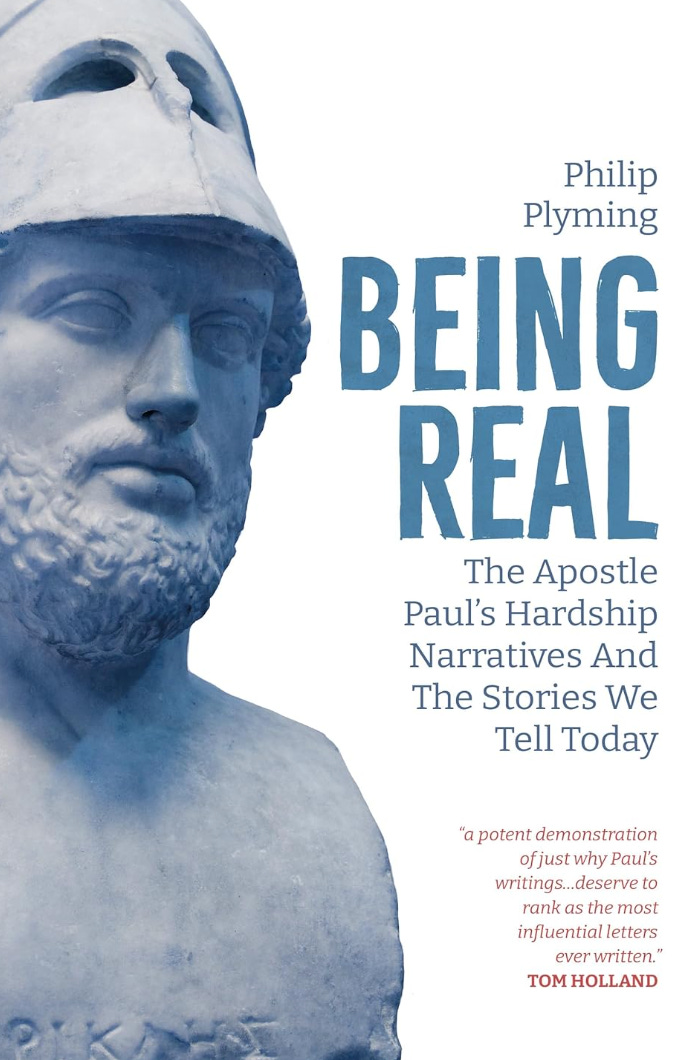Philip Plyming, Warden at Cranmer Hall, Durham, England, has a new, fresh, and pastorally-rich book about the apostle Paul. I was requested to endorse this book. Frankly, I couldn’t put it down. Very very few books about Paul touch the heart of Paul. Discussions about justification, the apocalyptic Paul, or Paul within Judaism tend to make Paul an intellectual figure. But he was real. He was a missionary planting churches in well-known locations. But he was also persecuted over and over and over. His life was loaded with troubles and pain and suffering.
His heart comes to the surface with utter clarity in both 1 Corinthians and 2 Corinthians, especially the latter. The place to enter into Paul’s roadmap to mission can be found in 2 Corinthians. It was shaped by his sufferings and his hopes and his frustrations and his joys. Philip Plyming’s new book, Being Real: The Apostle Paul’s Hardship Narratives and the Stories We Tell Today.
Those who have suffered, who have been abused, who know the pain of gospel work — and Plyming shares his stories of each of these — find Paul not so much as a theoretical intellectual but as a man filled with pain, a man for whom the gospel and life of Christ made sense of his own suffering and pain.
Paul was a traumatized apostle — again and again and again/
Here’s an excerpt from the opening to Plyming’s wonderful book.
The real Paul
One of the things that marks Paul out is his willingness to be honest about the things that have gone well and the things that haven’t. He does not hide the challenges that he has experienced in his walk with Jesus Christ. He is fully able to express joy and thankfulness and praise, but he is also willing to voice his own challenges and the impact they have had on him.
In Philippians (back to that letter again!), he is able to start in joyful vein – ‘I thank my God every time I remember you, constantly praying with joy in every one of my prayers for all of you’ (Phil. 1.3–4) – but also to be honest about his own imprisonment and his sharing in the sufferings of Christ (Phil. 1.12–14; 3.10).
In 1 Thessalonians, Paul opens himself up when he writes, ‘So deeply do we care for you that we are determined to share with you not only the gospel of God but also our own selves, because you have become very dear to us’ (1 Thess. 2.8). But he also refers to his own distress and persecutions a number of times (1 Thess. 2.2, 9; 3.4, 7).
And in what is perhaps Paul’s final letter, 2 Timothy, he uses the intimate phrase ‘my beloved child’ to refer to Timothy (2 Tim. 1.2) and declares himself an open book when he writes, ‘Now you have observed my teaching, my conduct, my aim in life, my faith, my patience, my love, my steadfastness, my persecutions, and my suffering the things that happened to me in Antioch, Iconium and Lystra. What persecutions I endured!’ (2 Tim. 3.10–11).
Paul is capable of being thankful for things that have gone well, and honest about when life has been a real challenge. In fact, he is a lot more honest and vulnerable about his experience of the Christian life than he is often given credit for.
And nowhere is this vulnerability more on display than in the letters we call 1 and 2 Corinthians. These letters, probably written in the mid to late 50s ad, contain some of the most intimate disclosures in all of Paul’s writings. Although he starts with giving thanks (1 Cor. 1.4–9), he then, on no fewer than six occasions, goes out of way to tell his Corinthian readers how tough his life has been.1 He talks about beatings he has received, despair he has felt, failures he has experienced, criticism he has been given. At one point he says, ‘We were so utterly, unbearably crushed that we despaired of life itself.’ (2 Cor. 1.8). Wow.
Paul is holding nothing back when it comes to telling his Corinthian audience what his life is really like.
Being real
As I have read these passages in 1 and 2 Corinthians over the years, I have really appreciated Paul’s honesty and openness. I say that because in some of the Christian circles I have moved in over the last 30 years, that hasn’t been the case. I have often witnessed a pressure to emphasize the positive aspects of our Christian experience. ‘I trust you’re thriving!’ starts the email, and it is quite hard to respond with anything other than the affirmative. At conferences, speakers are frequently unremittingly upbeat and testimonies often end on a positive note. Christian organizations and institutions cultivate a reputation of growth and achievement; stories that point in a different direction rarely get a mention.
This pressure to emphasize the positive has been turbo-charged by a growth in social media, where so much attention is given to presenting an image that followers will ‘like’. Along with so many Christians, we find ourselves telling a story in which we are doing well.
The image says we are thriving.
Yet my experience of the Christian life over the last 30 years has been much more mixed. I’ve witnessed some very positive things happen. I’ve seen people of all ages come to faith. I’ve seen people healed. I’ve seen individuals respond to God’s call in their lives to do something new for the Lord. I’ve seen prayers answered and lives changed. I have known joy and hope and peace in my own heart.
But I’ve also seen much more challenging things take place. I’ve seen people walk away from faith. I’ve seen projects go badly wrong. I’ve seen partnerships fail amidst conflict and tension. I’ve taken and spoken at funerals in the most tragic of circumstances. I’ve seen people live with long-term illness and never get better.
This experience of brokenness has also been closer to home. I have reached points of real physical and emotional exhaustion. Anxiety, something that I have lived with since my teenage years, has at times been so bad that sleep has been very challenging.
I’ve also spent all my Christian life coming to terms with abuse that happened to me as a teenager. When I was about 13, I was groomed and then sexually abused by my parish priest. It was a secret and I didn’t tell anyone at the time. Like many survivors of child sexual abuse, I buried it deep within. Many years later I gave evidence in his trial, which resulted in a custodial sentence. But the experience of giving evidence was as traumatic as the original abuse, and I suspect the impact will be lifelong.
Telling the hard stories
One of the things that has been hard has been that the vocabulary for talking about the hard stuff – and how God might be at work in the midst of it – hasn’t really been there. It is easy to tell stories where things have gone well, and we can easily point to God being at work. But talking about failure and disappointment and unresolved struggle – there hasn’t been an obvious framework for talking about these experiences in a way that connects to God.
And yet I want to say that I have seen God at work in these tough places. In both my own life and the lives of people I have worked among, it has not been the case that God has been absent when life has been grim. God hasn’t waved a magic wand and caused all the tough stuff to go away, but God has been present, working in some special, intimate, compassionate, humbling, transforming ways. It’s not always been easy to see this at the time, but I have had more than glimpses of God’s grace.
Which is why I love the fact the Paul does talk about this tough stuff in these passages from 1 and 2 Corinthians. He doesn’t bury the difficult stories, nor the impact they have had on him. He is upfront about the reality of his suffering and he points to ways God has been at work.
It’s not always pretty, but it is real.






Scott I have admired your work as a scholar, teacher and author for several years. Because you kept it “real” today I have an even greater appreciation for you as an authentic fellow traveler. Sometimes, when hope is hard to find, giving up and ending it all is so attractive. But every testimony by those who pressed on one day at a time is a witness that hope may be faint, but somehow it isn’t gone.
Thanks Scott.
I have heard more than one large church pastor begin a service by asking, “How are you all doing today?” Then, without skipping a beat, he (always a he) says, “Great!” It’s as if there’s no room for pain or lament or frustration or disappointment in the presence of God in worship. We need more real pastors engaging with real Christians.